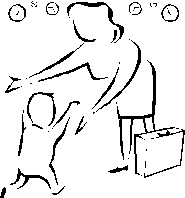|
|
Life Observations: Compassion |
|
Work in Progress Having battled depression and suffered anxiety problems tends to make me hyper-sensitive as far as feelings go. Yet, I'd rather be over-sensitive than IN-sensitive. I've witnessed extremes and strange amalgamations of sensitivity in people. Sometimes I felt that the need to be nurtured was a weakness, or at least a pathetic female trait. Recently, I was informed by a male friend who was lending an ear that we all need nurturing from our partners. Compassion is something that seems to be lacking in many people I have met. I do not expect bad behavior on my part to be acceptable to partners or friends simply because "I have problems". I don't feel that bad behavior or "acting up," as it's referred to in the psychotherapy field, is excusable in anyone. Just because someone declares that they have a problem with (insert problem here) doesn't mean any bad behavior is then excused! However.... we all have bad days. People must realize that sometimes it's the apology that is crucial. A partner on the receiving end must also understand and have empathy. Selfish people are more than likely unable or unwilling to empathize (put themselves in someone else's position). They tend to capitalize on how your being upset or hurt or angry has affected them. Partners who cannot ever give the nurturing one needs scare me. Having come across people who feel that because they did not deliberately hurt your feelings, they should never have to be sorry, it makes a person like me want to examine the psyche to see what on earth is happening. According to "Parenting" magazine, at age two children are already learning how to cope with emotions. If emotions are constantly derailed and discouraged (never cry, toughen up, walk it off, change the topic to make them laugh, etc.), compassion is not being encouraged in that child. Children should be encouraged to express their feelings, learn how to cope with them, learn they cannot act on them all, and learn to be empathetic to others. Many parents do not even encourage conciliatory gestures when children hurt someone. Thus we have the ever increasing trend that no one ever "stoops" to apologizing. It is very important to make children understand not only when he is wrong, but the consequences of his actions. (ex.: it was wrong to call your friend "stupid", it hurt his feelings - and you wouldn't feel good if your friend called you that) Explaining to a child to put himself in someone else's position is an essential step toward making a child feel both guilt for the behavior and responsibility for how other people feel. Yes, to an extent we ARE responsible for other people's feelings. After reading the article about children, I realize how engrained and innate the lack of empathy can be in a grown man (or woman). No amount of explaining or love will change the way a they think, feel and act. If he/she is hurtful or dismisses your feelings, they will continue to. Now, as an adult, I neither need nor expect the type of nurturing that a parent gives a child, and I am even aware enough of my needs to ask for it at times. But on that same token, I don't need to hear "toughen up," "just get used to it," "you should be accustomed to that treatment by now, Gina, you are a woman" or "I'm sure the other person had their reasons for doing that to you" from my partner! That is not a supportive relationship! This is about as anti-compassionate as it gets. I'm not saying that I expect a partner to agree with me even if I was wrong, not at all. We all have times when we are vulnerable, and at those times we need a loving an empathetic partner. I truly believe that in a relationship it is important for both partners to recognize (or even ask) when or what to do when the other needs some compassion and encouragement. I'm finding more and more that none of this can be one-sided. I seem to be doing ok giving the caring and support, however I haven't had very good luck finding a partner who can give it back.......... Work in Progress |

